| Srl | Item |
| 1 |
ID:
167575
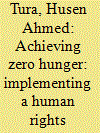

|
|
|
|
|
| Summary/Abstract |
A human rights approach to food security seeks to empower vulnerable groups to claim their rights. It also reinforces a government’s obligations to respect, protect and fulfil the right to food. Furthermore, it encourages the integration of the right to food into the design and implementation of food security policies. This article examines the human rights approach to food security, with specific reference to Ethiopia. It assesses the historical causes of Ethiopia’s food insecurity, and examines the legislative and policy measures that the country has adopted over the last three decades in order to achieve food security. Food insecurity in the country is largely explained by the absence of government accountability. In 1973 and 1984, the hunger caused by drought was transitioned to famine not because of overall unavailability of food in the country, but because the government failed to provide food aid to the starved people and concealed the occurrence of famines from the international donors. Despite designing some food security policies over the last three decades, the country has not yet adopted sufficient legislative and judicial measures to enforce the right to food. This article argues that Ethiopia should introduce a framework law on the right to food to end hunger in the context of achieving national food security.
|
|
|
|
|
|
|
|
|
|
|
|
|
|
|
|
| 2 |
ID:
162622
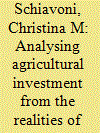

|
|
|
|
|
| Summary/Abstract |
Over the past decade, agricultural investment has been presented as a catchall solution to a converging set of global crises, often with poor rural communities as the proclaimed beneficiaries. Yet the promises of such investment, such as poverty alleviation and improved food access, are routinely at odds with realities on the ground. This article offers frameworks for analysis of agricultural investment that are grounded in the realities of small-scale food providers, drawing from two studies. The first study employs a right to food framework to identify the main channels through which food for consumption is procured by small-scale food providers and the factors impacting these channels. It draws on empirical data from within the Southern Agricultural Growth Corridor of Tanzania (SAGCOT), an investment model promised to lift rural communities out of poverty, which reflects a regional trend. Based on the shortcomings of the large-scale investments examined, the second study employs a food sovereignty framework to explore alternative forms of investment envisioned and/or already being put into practice by small-scale food providers in the SAGCOT area and elsewhere in Tanzania. While two different frameworks formed the basis of two different studies, both the studies and their frameworks are interrelated. The final section of this article makes the case for why both the right to food and food sovereignty are essential lenses for understanding agricultural investment vis-à-vis small-scale food providers and the ways in which they can serve as complementary tools for effective analysis.
|
|
|
|
|
|
|
|
|
|
|
|
|
|
|
|
| 3 |
ID:
156817
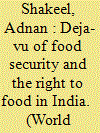

|
|
|
|
|
| Summary/Abstract |
Adnan Shakeel discusses the importance of the concept of food security at both the international and national levels. He also deals with food security and the right to food with respect to a sense of déjà vu in India. That is, even after becoming self-sufficient in food and with a strong foundation of the right to food, a number of people are still food insecure.
|
|
|
|
|
|
|
|
|
|
|
|
|
|
|
|
| 4 |
ID:
124931
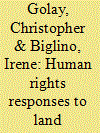

|
|
|
|
|
| Publication |
2013.
|
| Summary/Abstract |
This article approaches the debate on 'contemporary land grabbing' from a human rights perspective, focusing on one right that is particularly threatened: the right to food. It sketches an analytical framework grounded in international human rights law and the contribution such a framework can bring to the land-grabbing debate. Following a brief historical background on the right to food and its articulation in international human rights law, the paper expands on this by focusing on what can be called human rights responses to land grabbing from a right to food standpoint. The analysis considers the contributions of different actors in the human rights sphere and examines the role of the UN Committee on World Food Security and its recently adopted Voluntary Guidelines on the responsible governance of tenure of land, fisheries and forests. It also investigates how the phenomenon has been addressed by the UN human rights mechanisms, drawing on relevant practice of the UN treaty bodies and the Human Rights Council, with a focus on the Special Rapporteur on the right to food and the Special Rapporteur on the human rights situation in Cambodia. The engagement of regional human rights system with the issue of large-scale land transactions is also analysed.
|
|
|
|
|
|
|
|
|
|
|
|
|
|
|
|
| 5 |
ID:
179293
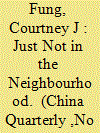

|
|
|
|
|
| Summary/Abstract |
Much has been written about China's active engagement and progressive approach to the “responsibility to protect,” a norm that reframes state sovereignty not as a right but as a responsibility. China's response to the “Report of the UN Commission of Inquiry on human rights in the Democratic People's Republic of Korea (DPRK),” which invokes the norm, however, challenges existing literature. China flatly refuses to uphold the responsibility to protect in the case of the DPRK, despite using previously supported standards to invoke the norm elsewhere and the report's dozens of consensual recommendations. This article is the first to systematically investigate how China has responded to the report. It shows that China's responses are shaped by its exceptionalism and concerns that the responsibility to protect could lead to regime change. I conclude with implications for the broader question of China's engagement with international norms in its near abroad. In my discussion, I draw on interviews with Korean and Chinese foreign policy elites, UN and US officials and DPRK human rights advocates, as well as primary and secondary documents.
|
|
|
|
|
|
|
|
|
|
|
|
|
|
|
|
| 6 |
ID:
096179
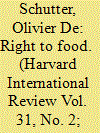

|
|
|
| 7 |
ID:
162621
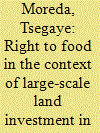

|
|
|
|
|
| Summary/Abstract |
Since the global food crises of 2007, smallholder farmers, pastoralists, indigenous peoples and other rural groups in many developing countries have seen their access to land, water and forest resources being threatened and reduced due to the acquisition of those resources by other actors – acquisitions that may have been promoted by state policies. Taking up the case of Ethiopia, this article aims to explore the implications of large-scale agricultural investments for local food security and the right to food. The article argues that in the context of the recent and ongoing large-scale agricultural investments driven primarily by the state, the interpretation and realisation of the right to food becomes a politically contested issue and that such investments run counter to implementing the state’s obligation to protect local people’s access to and procurement of adequate food. It argues that the large-scale agricultural investments both condition and pervert the realisation of food security.
|
|
|
|
|
|
|
|
|
|
|
|
|
|
|
|